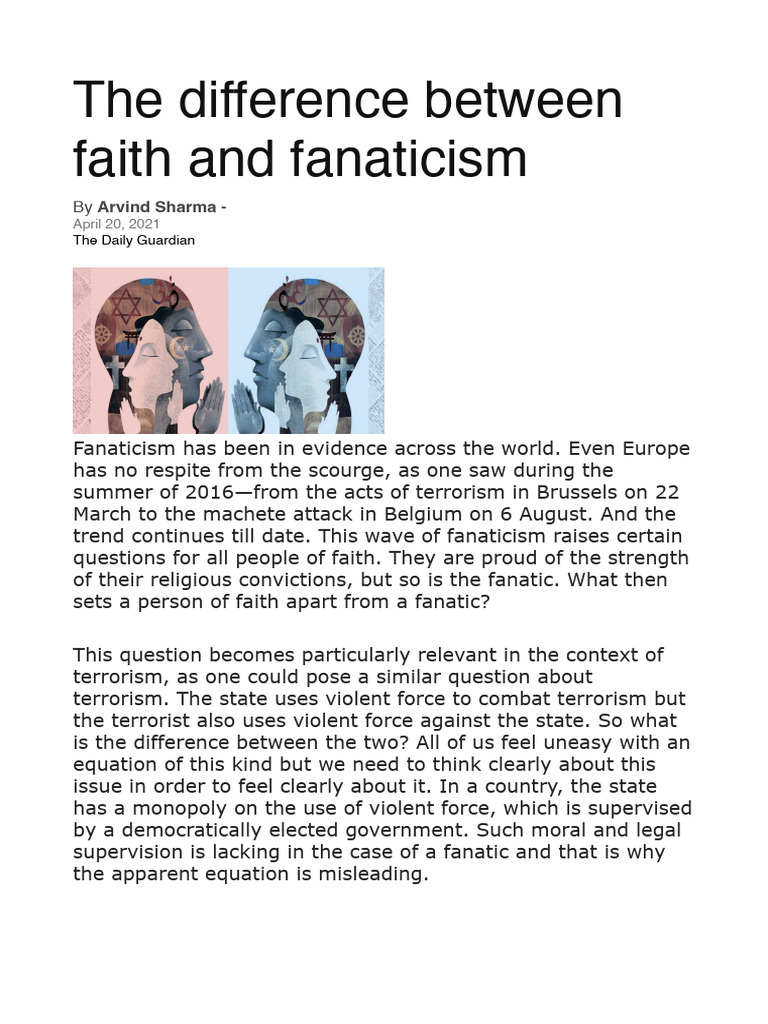The Bahá’í Faith offers profound insights into the nature of spirituality and the human condition. Central to its teachings is the contrast between godliness and fanaticism, where the former signifies a deep, genuine connection with the Divine and the latter embodies an extreme and often distorted interpretation of religious fervor. Understanding this distinction is instrumental in fostering a spiritual life that is harmonious, compassionate, and reflective of the deeper truths espoused by the Bahá’í teachings.
At the core of the Bahá’í philosophy is the assertion that humanity is inextricably linked to the divine essence of God. This relationship affirms the innate potential of every individual to attain spirituality and express virtues such as love, compassion, and justice. Godliness, in this context, refers to a state of being characterized by the embodiment of these virtues, which not only uplift the individual but also contribute positively to society at large.
In contrast, fanaticism emerges from a misinterpretation of religious principles, marked by an exclusionary mindset and a fervent adherence to rigid dogmas. This extreme devotion often leads to divisiveness, intolerance, and conflict, which starkly opposes the inclusive and universal tenets of the Bahá’í Faith. The seeds of fanaticism can be sown in the fertile ground of ignorance, where individuals misinterpret sacred texts and neglect the essence of the spiritual message they convey.
To elucidate the crucial distinctions between godliness and fanaticism, it is essential to explore several key dimensions:
1. Understanding of Divine Nature
The Bahá’í Faith elucidates that God is not only transcendent but also immanent, existing within all of creation. Followers are urged to perceive the Divine through the lens of unity and love, emphasizing a holistic approach to spirituality. In contrast, fanatics often project a truncated view of God, one that instills fear and exclusivity, leading them to view others as adversaries rather than fellow seekers of truth.
2. Interpretation of Sacred Texts
Adherents of the Bahá’í teachings are encouraged to engage with sacred texts critically and thoughtfully. The emphasis is placed on understanding the underlying principles of love, justice, and service to humanity. Conversely, extremists may cling to literal interpretations or selective passages that reinforce their narrow worldview, often weaponizing faith as a means of exclusion rather than embracing its unifying essence.
3. The Role of Service in Spirituality
Service to humanity is a cornerstone of Bahá’í practice, considered an essential manifestation of one’s spirituality. Engaging in acts of kindness and contributing to societal betterment exemplifies true godliness. Fanaticism, on the other hand, frequently results in self-serving agendas cloaked in piety, where the notion of service is limited to the advancement of a specific group or ideology, thereby undermining the communal ethos that the Bahá’í Faith embodies.
4. Attitude Towards Diversity
The Bahá’í principle of the oneness of humanity celebrates the rich tapestry of diverse cultures, beliefs, and practices. This inclusivity is an expression of godliness that acknowledges the legitimacy of various paths to the Divine. In sharp contrast, fanaticism breeds an antagonistic attitude toward diversity, leading to an unyielding stance that seeks to impose its beliefs upon others. This intolerance not only stifles personal growth but also propagates conflict and division.
5. The Pursuit of Knowledge
The pursuit of knowledge and understanding is highly valued within the Bahá’í community. Engaging with the world, seeking truth, and embracing education allows individuals to approach their spirituality with an open heart and mind. Fanaticism, however, shuns critical thought, often labeling inquiry as heresy. In such environments, ignorance prevails, and dogmatism flourishes, further entrenching individuals in their extremist views.
6. The Importance of Community
Community plays a fundamental role in the Bahá’í approach to spirituality. It is within the community that individuals find support, encouragement, and accountability in their spiritual journey. This sense of belonging nurtures a spirit of cooperation and collaboration. Conversely, fanaticism often leads to isolation, as extremists may erect barriers that alienate them from broader society, perpetuating a cycle of division and hostility.
7. Attaining Balance and Moderation
Achieving balance and moderation is a vital aspect of the Bahá’í teachings. The Faith advocates for a harmonious lifestyle that integrates spiritual and material pursuits, recognizing that both aspects are integral to the human experience. In contrast, fanaticism often manifests as an extreme preference for either material or spiritual pursuits, resulting in an imbalanced and ultimately unsustainable lifestyle.
In conclusion, the teachings of the Bahá’í Faith emphasize the importance of cultivating godliness, a journey characterized by love, service, and an unwavering commitment to truth and unity. This path stands in stark contrast to the narrow and often destructive tendencies of fanaticism, underscoring the necessity for believers to embody the virtues of humility, open-mindedness, and compassion. In navigating the spiritual landscape, it is imperative for individuals to be vigilant against the allure of extreme views, thereby fostering a world that reflects the true essence of divinity—a world united in diversity, peace, and love.
